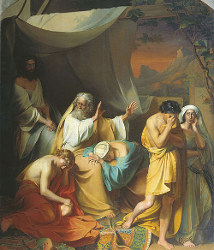My Three Sons
The deluge had passed, and the ark had been parked. It was now time for Noah and his family to enter into the postdiluvian “brave new world” that awaited them. Noah’s first act after debarkation was to build an altar and offer sacrifices to the Lord. This act elicited God’s promise that He would not smite every living thing again as He had done (Gen. 8:20-22).
The Lord then established a “covenant” with Noah and his descendants (9:9). Since we all are his descendants, the regulations of this covenant apply to all of mankind. The Jewish tradition states that the Noahic Covenant illustrates what God expects of all people, not just the Jews. The provisions of the Noahic Covenant regarding the spread of life, the source of life and the sanctity of life are given in Genesis 9:1-7. God pledged His faithfulness to these promises by the token of a “bow in the cloud” (Gen. 9:12-17). As a warrior or hunter hangs up his bow after using it, the LORD placed His bow in the sky after He shot it at the earth with the flood. By this sign, He promised that He would not perform that same act again!
Noah’s three sons—Shem, Ham and Japheth—became the progenitors of new life on an earth that had been wrecked by the flood but also purified from its ungodly inhabitants (Gen. 6:7). As the sons are mentioned in the text, Genesis 9:18 records a tiny piece of information that is important in understanding the rest of the account: “Ham was the father of Canaan.”
The following verses (9:20-27) record a sad event in the life of Noah, the man of whom it had been said, “Noah was a righteous man, blameless in his generation. Noah walked with God” (Gen 6:9). These verses describe the fall of a good man. “Noah began to be a man of the soil, and he planted a vineyard. He drank of the wine and became drunk and lay uncovered in his tent” (Gen. 9:20-21). Scripture records both the victories and the defeats of God’s people. That fact is an often overlooked evidence of the Bible’s truthfulness, since authors tend to play down the faults of their “heroes.”
Only one who has been personally touched by the evil of drunkenness can fully appreciate the terrible shame for all the family that results from overindulgence. “Wine is a mocker, strong drink a brawler, and whoever is led astray by it is not wise” (Prov. 20:1). In this instance, the fairest flower that humanity had thus far yielded suddenly wilted. However, Noah’s disgrace was only increased by his younger son’s subsequent action. “And Ham, the father of Canaan, saw the nakedness of his father and told his two brothers outside” (Gen. 9:22). The exact nature of Ham’s deed has caused much discussion among commentators. An accidental glance at his father’s nakedness would not seem to merit the harsh judgment on a group of Ham’s descendants that later follows.
Leviticus 18 may provide help in this regard. That chapter warns the Israelites against some of the abominable sexual practices of the Canaanites. The particular sexual sin condemned is that of unlawful relations between near relatives (i.e., incest). The phrase that is used to describe the act is “to uncover nakedness” (Lev. 18:6-18). Therefore, there are many who see Ham’s sin as sexual abuse of Noah while his father was in a drunken stupor. Then to make matters even worse, Ham went out and declared (Hebrew word nagad) the fact to his brothers in a boastful and arrogant spirit.
Ham’s brothers, however, did not share his disgraceful glee. “Then Shem and Japheth took a garment, laid it on both their shoulders, and walked backward and covered the nakedness of their father. Their faces were turned backward, and they did not see their father’s nakedness” (Gen. 9:23). Shem and Japheth continued to honor their father (Ex. 20:12), even when he was in a state of dishonor. Their approach was characterized by sensitivity and not sensuality.
“Noah awoke from his wine and knew what his youngest son had done to him” (Gen. 9:24). When his head cleared and he realized what had happened, Noah uttered what one writer has termed “the most far-reaching prophecy in the entire Bible.” Genesis 9:25-27 then records a series of simple yet profound prophetic utterances consisting of one curse and two blessings. These prophecies extend far beyond Noah’s immediate offspring to the yet unborn generations that would issue from his sons. In effect, the future history of the human race is found in its broadest outlines in these amazing verses. We will consider each separately in future posts.
Will Varner Bio
Will Varner is Professor of Bible & Greek at The Master’s College. He earned a BA from Bob Jones University, MA from Dropsie College, MDiv and ThM from Biblical Theological Seminary and EdD fromTemple University. He blogs at DrIBEX Ideas.
- 62 views



Discussion